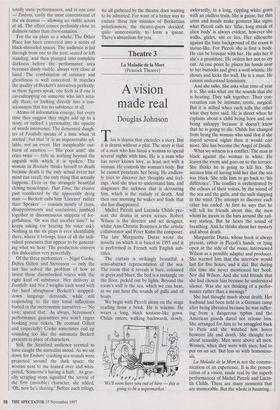Theatre 3
A vision made real
Douglas Johnson
This is drama that encircles a story. But it is drama without a plot. The story is that of a man who has hired a woman to spend several nights with him. He is a man who has never known love, at least not with a woman. He controls the woman's body. But he cannot penetrate her being. He endless- ly tries to discover her thoughts and feel- ings. And she tries to understand him, and diagnoses the sickness that is devouring him, which is the malady of death. And then one morning he wakes and finds that she has disappeared.
Michel Piccoli and Lucinda Childs pre- sent the drama in seven scenes. Robert Wilson is the director and set designer, whilst Ann-Christin Rommen is the artistic collaborator and Peter Kuhn the composer. The late Marguerite Duras wrote the novella on which it is based in 1993 and it is performed in French with English sub- titles.
The curtain is strikingly beautiful: a semi-abstract representation of the sea. The room that it reveals is bare, coloured in greys and blues; the bed is a rectangle on the floor, picked out by lights. Beyond the room's wall is the sea, which we can hear, as we can hear the sounds of gulls and of boats.
We begin with Piccoli alone on the stage reading from a book. He is solemn. He wears a long, black soutane-like gown. Childs enters, walking backwards, slowly, `We'll soon have you out of here — this is going to be a supermarket.' awkwardly, in a long, rippling white gown with an endless train. She is gaunt, her thin arms and hands make gestures like signs; what Piccoli calls her 'lithe, long streak of alien body' is always evident, however she walks, glides, sits or lies. Her silhouette against the bare background of the room is statue-like. For Piccoli she is first a body. He can be brusque with her. He asks her if she's a prostitute. He orders her not to cry out. At one point he places his hands near to her buttocks and gives a wolf-whistle. He shouts and kicks the wall. He is a man. He cannot understand femininity.
And she talks. She asks what time of year it is. She asks what are the sounds that she is hearing. They talk together. Their con- versation can be intimate, erotic, surgical. But it is stilted when each tells the other what they have said. He is direct when he explains about a child being born and not being unhappy because it doesn't know that he is going to die. Childs has changed from being the woman who said that if she stayed several nights then it would cost more. She has become the Angel of Death.
What we witness is a conflict. The man in black against the woman in white. He leaves the room and goes on to the terrace. She thinks he is going to kill her. She accuses him of having told her that the sea was black. She tells him to go back to 'his difference'. The conflict is orchestrated by the echoes of their voices, by the sound of the sea and the gulls, and the sails slapping in the wind. The attempt to discover each other has ended. At first he says that he will tell his friends about this, the men whom he meets in the bars around the rail- way station. But he hears the sound of breathing. And he thinks about her mystery and about death.
Marguerite Duras, whose book is always present, either in Piccoli's hands, or lying open at the side of the room, interviewed Wilson as a possible adapter and producer. She warned him that the interview would last for five hours, and it did. But during this time she never mentioned her book. Nor did Wilson. And she told friends that she had chosen him because he understood silence. Was she not thinking of a perfor- mance rather than a message?
She had thought much about death. Her husband had been held in a German camp after being liberated because he was suffer- ing from a dangerous typhus and the American guards dared not release him. She arranged for him to be smuggled back to Paris and she Watched him hover between life and death. She thought too about sexuality. Men were above all men. Women, when they were with men, had to put on an act. But less so with homosexu- als.
La Maladie de la Mort is not the commu- nication of an experience. It is the presen- tation of a vision, made real by the superb performances of Michel Piccoli and Lucin- da Childs. There are many moments that are memorable. But the whole is haunting.










































































 Previous page
Previous page